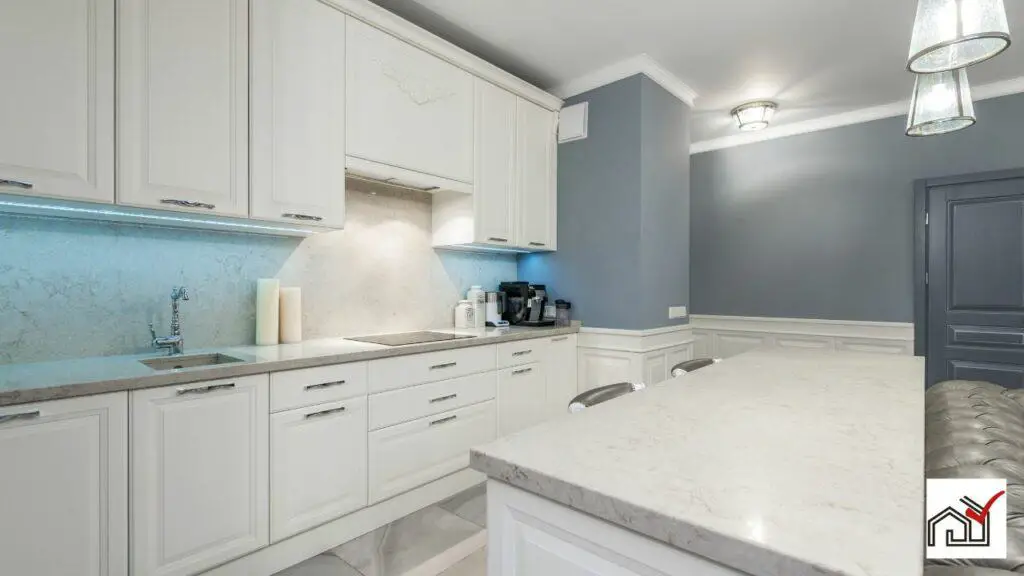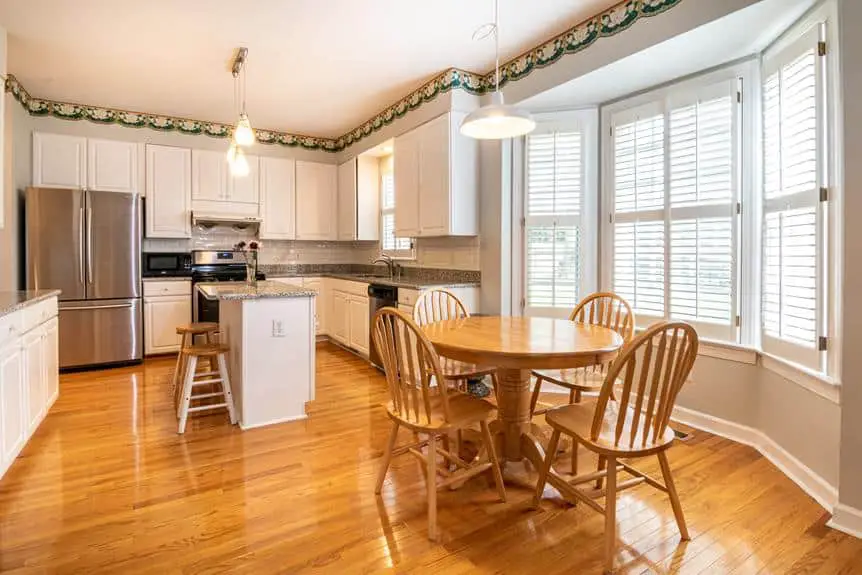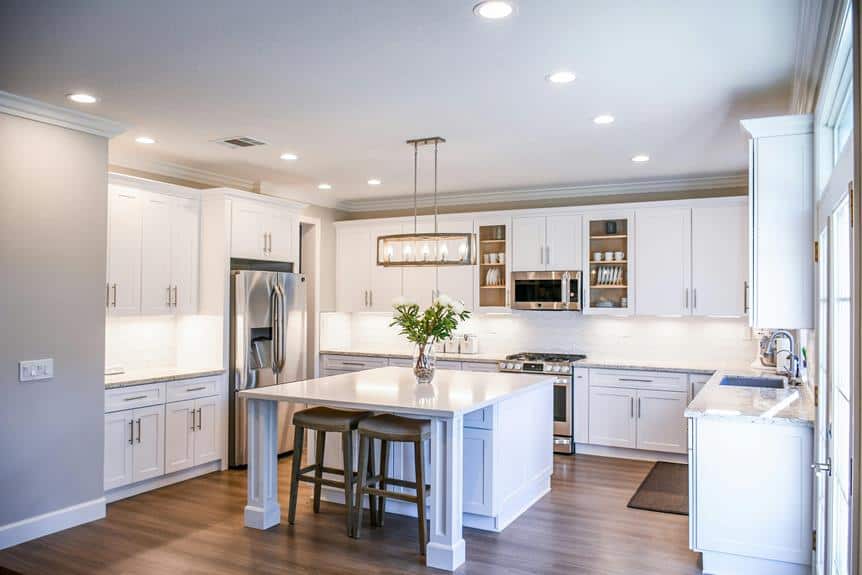Butcher block countertops are durable and add a warm, natural look to kitchens. They are made from hardwood pieces and their durability depends on the type of wood and finish used.
Regular maintenance, including oiling and sealing, is necessary to keep the wood in good condition and to extend its life. While they can be scratched and are not completely resistant to moisture, with proper care, butcher block countertops can last for many years.
They are suitable for both home and commercial kitchen settings.
Understanding Butcher Block Composition
Butcher block countertops are made by gluing together strips of hardwood, resulting in a strong and even surface. This construction not only looks good but also makes the countertops durable and suitable for regular kitchen use.
The choice of wood affects the countertop’s durability and appearance. Common woods used include maple, which is hard and wear-resistant; oak, known for its distinctive grain and sturdiness; acacia, with its rich color and varied grain; and bamboo, which is hard and eco-friendly.
The direction of the wood grain also impacts the countertop’s durability. Edge grain countertops have wood planks joined with the long edge up, creating a durable surface. End grain countertops, with a checkerboard look, are made with wood ends up, offering a cutting surface that is kind to knives and shows fewer cut marks.
Butcher block countertops naturally expand and contract with temperature and humidity changes. They are porous and require regular oiling to prevent drying and cracking, maintaining their durability over time.
The Impact of Wood Type
The type of wood used for butcher block countertops affects their durability and maintenance requirements. Hardwoods such as maple and oak are durable and less likely to scratch or dent, while softer woods like pine are more susceptible to damage and require more maintenance.
Choosing wood for butcher block countertops involves considering both appearance and practicality. Teak and cherry wood offer rich colors that can conceal small imperfections and add warmth to a kitchen but may be costlier and need more upkeep. Bamboo has a lighter appearance and is environmentally friendly but may not withstand heavy use as well.
Butcher block countertops are prone to water damage and staining, which can be worse in softer woods. These woods may need more frequent sealing to protect against moisture. The grain orientation affects durability too; end grain blocks are better for cutting and show less wear than edge grain but are usually more expensive.
Finishes and Durability
The durability of butcher block countertops is significantly influenced by the type of finish applied. Although these countertops offer a warm and inviting appearance, they are more prone to scratches and dents compared to harder surfaces like stone or metal. Applying the correct finish can enhance their resistance to everyday kitchen use.
Finishes play a critical role in extending the lifespan of butcher block countertops. For example, using a food-safe mineral oil not only conditions the wood but also forms a protective layer against water, which helps prevent warping, mold, and stains caused by moisture absorption.
It’s important to note that butcher block countertops are also sensitive to heat. Placing hot items directly on the wood may result in burn marks or cracking. While a proper finish can slightly increase heat resistance, it is recommended to use trivets or hot pads to prevent heat damage.
Daily Maintenance Requirements
Daily maintenance is vital for the longevity and appearance of butcher block countertops. Apply regular oiling to prevent the wood from drying and cracking. Clean the surface with mild soap and warm water using a soft cloth or sponge to remove debris and spills without scratching.
Do not use the countertop as a cutting board; use separate boards to prevent scratches and maintain cleanliness. Protect the wood from heat by using trivets or hot pads when placing hot pans on the surface.
To sanitize, mix equal parts warm water and white vinegar for an effective, wood-safe disinfectant. Clean spills immediately to prevent stains and water damage.
Following these maintenance steps will keep butcher block countertops in good condition.
Resistance to Scratches and Dents
Butcher block countertops are more prone to scratches and dents than stone or metal surfaces due to the softer nature of wood. They require careful use to avoid damage, as they are not ideal for withstanding heavy use or direct contact with hot pans. To prevent knife marks and maintain the wood’s condition, it is recommended to use cutting boards during food preparation.
If scratches or dents occur, they can be repaired by sanding the area and applying mineral oil to blend it into the surrounding wood. While butcher block countertops need regular maintenance, they can be a durable and appealing choice for those willing to care for them properly.
Longevity and Lifespan
Butcher block countertops typically last over 20 years due to the strength of the wood and careful maintenance by owners. Regular oiling and occasional sanding help preserve their appearance and functionality, making them a solid choice for kitchen renovations.
The type of hardwood, such as maple or oak, contributes to the countertops’ durability. The ability to sand away burns, dents, and scratches allows for restoration, extending their useful life.
Butcher block countertops are popular for their mix of traditional and modern looks. They are durable, withstand kitchen activity well, and are a practical option for kitchen design, offering both aesthetics and utility.
Mitigating Water and Heat Damage
To protect butcher block countertops from water and heat damage, it is necessary to apply a food-safe mineral oil sealant. This creates a barrier against spills and damage. Reapply the oil regularly, particularly near sinks to combat water exposure.
Avoid placing butcher block near dishwashers or sinks without proper sealing to prevent warping or mold. Always use trivets or hot pads for hot items to avoid burning the wood. Direct contact with hot pans can damage the surface.
If the countertop does get damaged, one can often sand the area with fine-grit sandpaper to fix it. Regular maintenance can extend the life of butcher block countertops.





